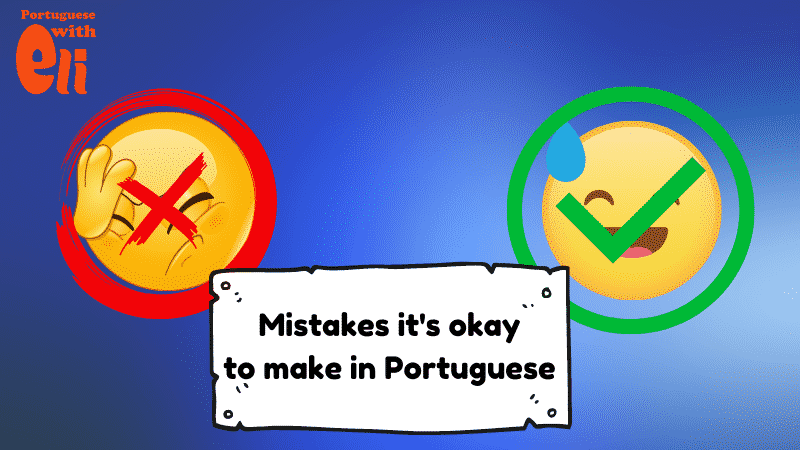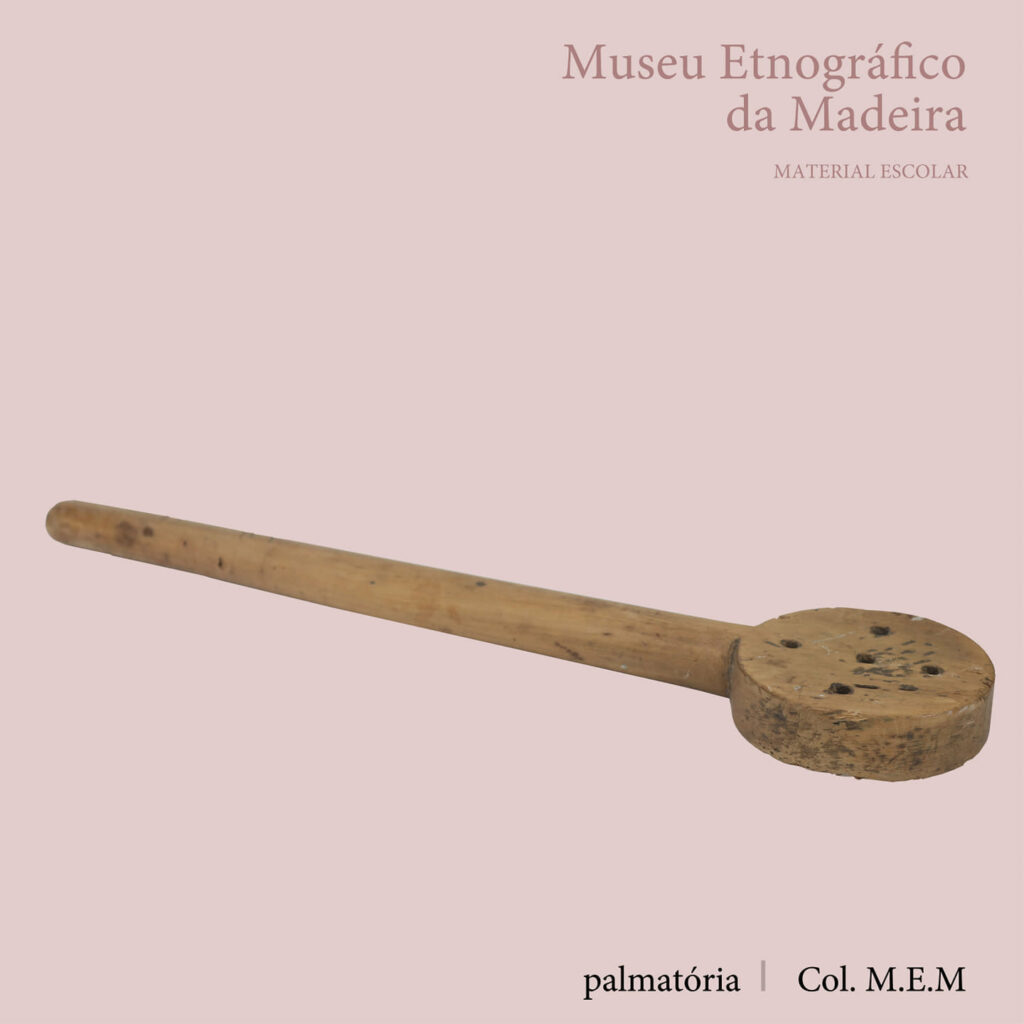5 Mistakes It’s Okay to Make in Portuguese

I saw it when I was a kid. It wasn’t very common in my time. But in my parents’ time, it was.
In Portuguese we call it “Palmatória”. Whenever a kid would not behave properly their parents would take this thing and slam the child’s hand with that.

But the parents didn’t have exclusive rights to it. Teachers did too. And when a student made a mistake — in the hand it went.
And even though we don’t hit people when they make a mistake, the fear of making a mistake and being punished for it still exists.
It’s so common. My students make a mistake and they apologize for making a mistake. I know, I know. We feel bad if we say something funny that we didn’t mean it to be funny. But students shouldn’t apologize for mistakes they make. They should make mistakes. It’s part of learning.
And even Brazilians also make mistakes.
And in this short article you’re going to see five “mistakes” it’s okay to make — and in fact, some of them will make you sound even more fluent and natural.
Mistake #1 – Tu vai?
If you’ve learned a little bit of Portuguese grammar you already know what is wrong with the question above.
In case you don’t, though, here’s what’s wrong:
It should read “tu vais”. That’s the correct conjugation of the second person “tu”.
But this is such a common mistake it doesn’t even qualify as a mistake. It’s just a different way of speaking.
As I said in this article (click here to go to the page), we don’t really use “tu” with a proper conjugation in Brazil. Granted, in some regions people still say “tu vais”, but it’s become the exception rather than the rule.
The only thing to note about this mistake is that it’s very informal. You wouldn’t use that at work. And you wouldn’t speak like that with people you must show some deference to.
Mistake #2 — Quem soltou os cachorro?
I know you have gone through great pains to learn how to properly make verb, noun and adjective agree. That’s why you say
- Os novos livros são muito interessantes.
Instead of
- Os novo livro são muito interessante.
But believe me — the second sentence is quite common in daily conversation.
The plural marker in Portuguese is the letter “s”. And, in verbs, it’s the ending that tells whether something is singular or plural.
But in daily conversation, you can drop the “S” from nouns and adjectives, provided that you use it in the article or the word that works as an article. See the example below:
- Os homem estão na frente da casa. The men are in front of the house.
- Não faço ideia de onde ele comprou esses livro. I have no idea where he bought these books from.
- Os dia e as hora passam tão devagar… The days and hours go by so slowly.
This is the kind of mistake that would make a grandmother frown if their grandchildren made it. But then the grandmother would turn to her daughter and make this very same mistake.
Mistake #3 — ela disse que ia “vim”
I’m not going to lie — whenever I hear someone saying “vim” instead of “vir,” I cringe. But that’s just me.
And you’re going to hear this a lot in Brazil. But don’t judge people when they make this kind of mistake. It’s a natural process due to the way the pronunciation of Brazilian Portuguese is evolving.
I don’t know if you have noticed but many people don’t pronounce the ending of verbs in the infinitive. They just stretch the sound (“falá”) instead of sounding the final R sound. It’s something you can learn from my free Brazilian Portuguese pronunciation guide — click here to access it.
And it can happen with just about any verb. Incidentally, that’s also the reason why many Brazilians drop the final R from verbs when texting.
With the verb “vir” (to come) it’s very hard to drop the final R and not confuse it with the past tense of the verb to see (eu vi). So people tend to unconsciously add a nasal sound to differentiate the verb to come from the past tense of to see.
- Ele vai “vim” mais tarde. He’ll come later.
- Não sei quando meus livros vão “vim”. Já faz um mês que eu os comprei. I don’t know when my books will arrive. I’ve bought them it’s been one month.
And oh: if your text with Brazilians often you’re going to see it.
Mistake #4 — eu tinha pago.
As a famous Brazilian composer and singer used to say, “Brazil is not for beginners.”
To which I would add: and of the Portuguese language is not for the fainthearted.
In addition to the innumerable conjugations we have, we also see verbs that have two participle forms.
Participles?
Yeah. Participles. We usually find the participles of the verbs by dropping the ending and adding -ado / -ido.
- Comprar – comprado
- Vender – vendido
- Cair – caído
And you probably remember we also have verbs with an irregular participle.
- Fazer – feito
- Dizer – dito
What you might not know is that some verbs have both a regular form and an irregular form. For the record, they are called “verbos abundantes”.
- Ganhar – ganho / ganhado
- Pagar – pago / pagado
And there is a simple rule as to when you have to pick either one. The regular forms are used only when you have the verbs “ter” / “haver” as auxiliaries.
- Ela tinha ganhado dez mil reais na loteria, mas já não tem mais dinheiro. She had won 10,000 Brazilian riyals in the lottery, but she doesn’t have money anymore.
- Eu ainda não tinha pagado a conta do restaurante quando a Maria se levantou e saiu. I hadn’t paid the restaurant bill yet when Maria got up and left.
The irregular forms are used when you have the verbs ser / estar as auxiliaries.
- Esse dinheiro foi ganho de maneira ilegal. This money was earned illegally.
- A conta está paga. The bill is paid.
The mistake here is related to “laziness.” When it comes to using our language, the easier the better. And of course, the regular forms are easier to use. They are shorter, simpler, and nicer. So, even when we needed to use the regular form, we still prefer to employ the irregular form.
That’s technically a mistake that can count against you if you are taking an official examination in Portuguese, but nobody cares if you don’t use the proper participle in daily conversation.
Mistake #5 — você está aonde?
When I was a teenager, I didn’t like to tell my mother where I was going. Whenever she asked, “Aonde é que você vai?” I would reply, “vou bem ali.”
And when I was away — and had a cell phone — my mother would call me and ask: “Aonde você está?”
This mistake is so common that many native speakers wouldn’t point it out if you asked them what was wrong with that question.
And I will spill the beans and stop the suspense — the mistake is that “onde” indicates a place where someone or something is whereas “aonde” indicates where someone is going to.
Thus, the question “aonde você está?” should be “onde você está?”
Below, you’ll find examples with the “wrong” forms.
- Onde (should read “aonde”) você vai nas suas próximas férias? Where are you going to go in your next vacations?
- Aonde (should read “onde”) você mora? Where do you live?
But as I said, Brazilians make this kind of mistake and don’t even notice.
So you can make this mistake with peace of mind of knowing that no one will slam your hand with a palmatória.
But should you make the mistakes Brazilians also make?
If you want to, do it. Now you are aware of them, and you can avoid them. And in the future when you make this kind of mistake you will know you are doing this on purpose. And you will not need to feel ashamed — you should feel proud to because you are speaking more naturally.
And tell me in the comments — what mistake do you make repeatedly in Portuguese?






